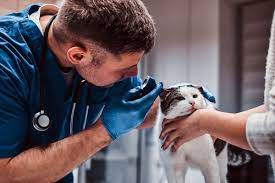
Veterinarians are dedicated healthcare professionals who specialize in the medical care and well-being of animals. Their role extends beyond caring for pets to include a wide range of animals, from livestock and wildlife to exotic species. Veterinarians play a vital role in promoting animal health, preventing the spread of diseases that can affect both animals and humans, ensuring food safety, and contributing to scientific research. With rigorous education and training, veterinarians provide a wide array of services, from routine check-ups and surgeries to specialized treatments and emergency care. Their commitment to animal welfare and public health makes them essential members of both the veterinary and healthcare communities.
Here are some interesting facts about veterinarians:
The practice of veterinary medicine has ancient roots, dating back to civilizations like Egypt in 2000 BCE. In these early societies, healers known as “animal doctors” treated livestock and other animals that were essential for agriculture, transportation, and companionship. These healers laid the foundation for the modern veterinary profession, emphasizing the importance of animal health in human society.
The establishment of the world’s first veterinary school in Lyon, France, in 1761 marked a pivotal moment in the formalization of veterinary medicine as a discipline. This institution paved the way for the systematic education and training of veterinarians, providing them with the knowledge and skills needed to care for animals effectively. It set a precedent for the development of veterinary education worldwide.
Veterinarians take a solemn oath similar to the Hippocratic Oath in human medicine. This oath underscores their commitment to using their scientific knowledge and clinical skills for the betterment of society, animal health, and welfare. It embodies the ethical principles that guide their practice, emphasizing compassion, integrity, and the well-being of animals under their care.
The American Veterinary Medical Association, founded in 1863, holds the distinction of being the oldest and largest veterinary medical organization globally. It serves as a unifying force for the profession, advocating for veterinary interests, setting standards of practice, and promoting advancements in veterinary science and education.
As of 2020, the veterinarian-to-pet ratio in the United States was approximately 1 veterinarian for every 1,600 pets. This statistic highlights the growing demand for veterinary services, given the increasing pet population and the expanding scope of veterinary care, which now includes preventive medicine, specialty care, and advanced diagnostics and treatments.
Veterinarians provide care for a wide spectrum of animals, including pets, livestock, wildlife, and exotic species. Their expertise spans across diverse species, from cats and dogs to cows, horses, and even zoo animals. This broad scope reflects the versatility and adaptability of the veterinary profession.
Veterinary medicine encompasses various specialties, allowing veterinarians to focus their expertise on specific areas such as surgery, internal medicine, radiology, pathology, dermatology, and more. These specialized fields enable veterinarians to provide advanced care and diagnostics tailored to the unique needs of different species.
Veterinarians play a pivotal role in the One Health approach, recognizing the interconnectedness of human, animal, and environmental health. They contribute to disease surveillance, zoonotic disease control, and collaborative efforts aimed at preventing health crises at the interface of animals, humans, and ecosystems.
Veterinarians are critical in preventing and controlling zoonotic diseases—diseases that can be transmitted between animals and humans. They help identify, monitor, and manage these diseases, reducing the risk of outbreaks and protecting public health.
In 1879, Dr. Linda Ann Detweiler made history by becoming the first female veterinarian in the United States. Her achievement broke gender barriers in the profession and paved the way for countless women who followed her into the field of veterinary medicine. Dr. Detweiler’s pioneering spirit serves as an inspiration for gender diversity in the profession.
The concept of animal hospitals began to emerge in the early 20th century, reflecting the growing need for specialized medical care for pets. These hospitals provide advanced diagnostics, surgery, and critical care for companion animals. The development of animal hospitals has transformed the way pets receive healthcare, allowing for more comprehensive and specialized treatments.
Veterinarians have played vital roles in wartime efforts, particularly during World War II. They were responsible for caring for military working dogs, horses, and other animals crucial to the war effort. These veterinarians ensured the health and well-being of animals serving alongside soldiers, highlighting the bond between humans and their animal companions during challenging times.
To practice veterinary medicine, individuals must obtain a license, which involves meeting specific education and examination requirements. Regulations governing the veterinary profession vary by country and state, ensuring that practitioners adhere to high standards of competence and ethics.
Veterinarians are instrumental in administering vaccines to prevent diseases in animals. By vaccinating pets, livestock, and wildlife, they not only protect individual animals but also contribute to public health by reducing the risk of zoonotic disease transmission. This role in vaccination is a vital component of preventive medicine.
Some veterinarians specialize in treating exotic pets, which can include reptiles, birds, small mammals, and even non-traditional pets like primates and big cats. Exotic animal veterinarians undergo specialized training to provide care for these unique and often non-domesticated species, addressing their distinct health and husbandry needs.
Equine veterinarians specialize in the health and well-being of horses, including racehorses, show horses, and working horses. Their responsibilities encompass not only medical care but also aspects of nutrition, performance, and musculoskeletal health. They play a pivotal role in maintaining the health and performance of these valued animals.
Veterinary inspection of food animals is crucial for ensuring the safety of meat, dairy products, and other animal-derived foods. Veterinarians monitor and regulate livestock production, conducting inspections at slaughterhouses and processing facilities to safeguard food quality and prevent the spread of foodborne illnesses.
Veterinarians contribute significantly to wildlife conservation efforts. They treat and rehabilitate injured or endangered wildlife, conduct research on wildlife health, and address issues related to habitat preservation and disease transmission between wildlife and domestic animals. Their work is integral to preserving biodiversity.
Becoming a veterinarian requires rigorous education, typically culminating in a Doctor of Veterinary Medicine (DVM) degree. This educational journey includes a blend of classroom learning, hands-on clinical training, and often specialized internships or residencies. It equips veterinarians with the knowledge and skills necessary for diverse clinical settings.
Some veterinarians practice holistic medicine, which involves integrating alternative therapies like acupuncture, herbal medicine, and chiropractic care into their treatment approaches. Holistic veterinarians consider the physical, emotional, and environmental aspects of an animal’s health, emphasizing a more holistic view of wellness.
Veterinarians are staunch advocates for animal welfare, championing humane treatment and ethical practices across all aspects of animal care. They work to ensure that animals are treated with compassion and respect, whether in clinical settings, agriculture, research, or wildlife conservation. This commitment to animal welfare extends to promoting responsible pet ownership and fostering positive relationships between humans and animals.
Veterinary organizations collaborate on a global scale to combat diseases and address animal health issues. Initiatives like the World Organization for Animal Health (OIE) and the Food and Agriculture Organization of the United Nations (FAO) facilitate international cooperation on disease surveillance, vaccination campaigns, and emergency response efforts. Veterinarians play key roles in these collaborative endeavors, promoting the health of animals and safeguarding global food security.
Veterinarians are indispensable in disaster response efforts, particularly when natural disasters strike. They provide critical support in caring for animals affected by events like hurricanes, wildfires, and floods. Whether it’s rescuing stranded animals, administering medical care, or setting up emergency shelters, veterinarians contribute to mitigating the impact of disasters on both domestic and wild animals.
Veterinary research is fundamental to advancing knowledge in fields such as genetics, immunology, epidemiology, and comparative medicine. Veterinarians engage in research to better understand diseases, develop treatments, and improve animal care. Their contributions have far-reaching implications, benefiting both animal and human health.
The use of telemedicine in veterinary care has seen significant growth, allowing veterinarians to provide remote consultations and advice to pet owners. Telemedicine offers greater accessibility to veterinary expertise, especially in underserved or remote areas. It also enhances convenience for pet owners seeking guidance on their animals’ health and well-being.
FAQs about Veterinarians:
1. What does a veterinarian do?
Veterinarians are animal healthcare professionals who diagnose and treat illnesses, injuries, and diseases in animals. Their duties can encompass a wide range:
- Preventative care: Regular checkups, vaccinations, parasite control, and nutritional advice to keep pets healthy.
- Medical care: Diagnosing and treating illnesses and injuries through examinations, lab tests, x-rays, and medications.
- Surgery: Performing a variety of surgical procedures, from spaying/neutering to more complex operations.
- Dental care: Cleaning teeth, treating dental disease, and performing oral surgery.
- Anesthesia and pain management: Ensuring pets are comfortable and safe during procedures.
- Behavioral counseling: Helping pet owners address behavioral issues like aggression, anxiety, or housetraining problems.
- End-of-life care: Providing compassionate care for terminally ill pets and advising owners on euthanasia.
2. What qualifications do you need to become a veterinarian?
Becoming a veterinarian requires a significant commitment to education and training:
- Undergraduate degree: Completing a bachelor’s degree in pre-veterinary medicine or a related science field.
- Veterinary school: Attending an accredited veterinary school, typically a four-year program with rigorous coursework in animal anatomy, physiology, pathology, pharmacology, and clinical rotations.
- Licensure: Passing the North American Veterinary Licensing Examination (NAVLE) to practice veterinary medicine in most areas of North America. Some states may have additional licensing requirements.
- Continuing education: Vets are required to participate in continuing education programs to stay up-to-date on the latest advancements in veterinary medicine.
3. What are the different types of veterinarians?
Just like human medicine, veterinary medicine has various specialties. Here are some examples:
- Small animal veterinarians: Focus on treating companion animals like dogs, cats, rabbits, and ferrets.
- Large animal veterinarians: Specialize in the care of farm animals like cows, horses, sheep, and pigs.
- Exotic animal veterinarians: Treat a wider range of animals, including reptiles, birds, amphibians, and small mammals.
- Emergency and critical care veterinarians: Provide specialized care for pets experiencing life-threatening emergencies or critical illnesses.
- Veterinary surgeons: Receive additional training to perform complex surgical procedures.
- Veterinary pathologists: Analyze tissues and fluids to diagnose diseases.
4. How do I find a good veterinarian?
Finding the right veterinarian for your pet is crucial. Here are some tips:
- Ask for recommendations: Talk to friends, family, fellow pet owners, or your local animal shelter for recommendations.
- Consider location and hours: Choose a veterinarian conveniently located and with operating hours that fit your schedule.
- Check credentials and experience: Research the veterinarian’s background, education, and areas of expertise.
- Schedule a consultation: Meet the veterinarian and staff to discuss your pet’s needs and assess their communication style and clinic environment.
- Ask about fees: Inquire about their fees for various services to ensure they align with your budget.
5. How much does a visit to the veterinarian typically cost?
The cost of a veterinary visit can vary depending on several factors:
- Location: Vet fees can be higher in urban areas compared to rural locations.
- Type of service: Routine checkups are generally less expensive than complex surgeries or emergency care.
- Diagnostic tests: Additional tests like x-rays, bloodwork, or ultrasounds add to the overall cost.
- Medication: Prescribed medications can add to the final bill.
It’s always best to call veterinary clinics in advance to get an estimate for the services you need. Many clinics offer payment plans or have financial assistance programs for pet owners in need.









